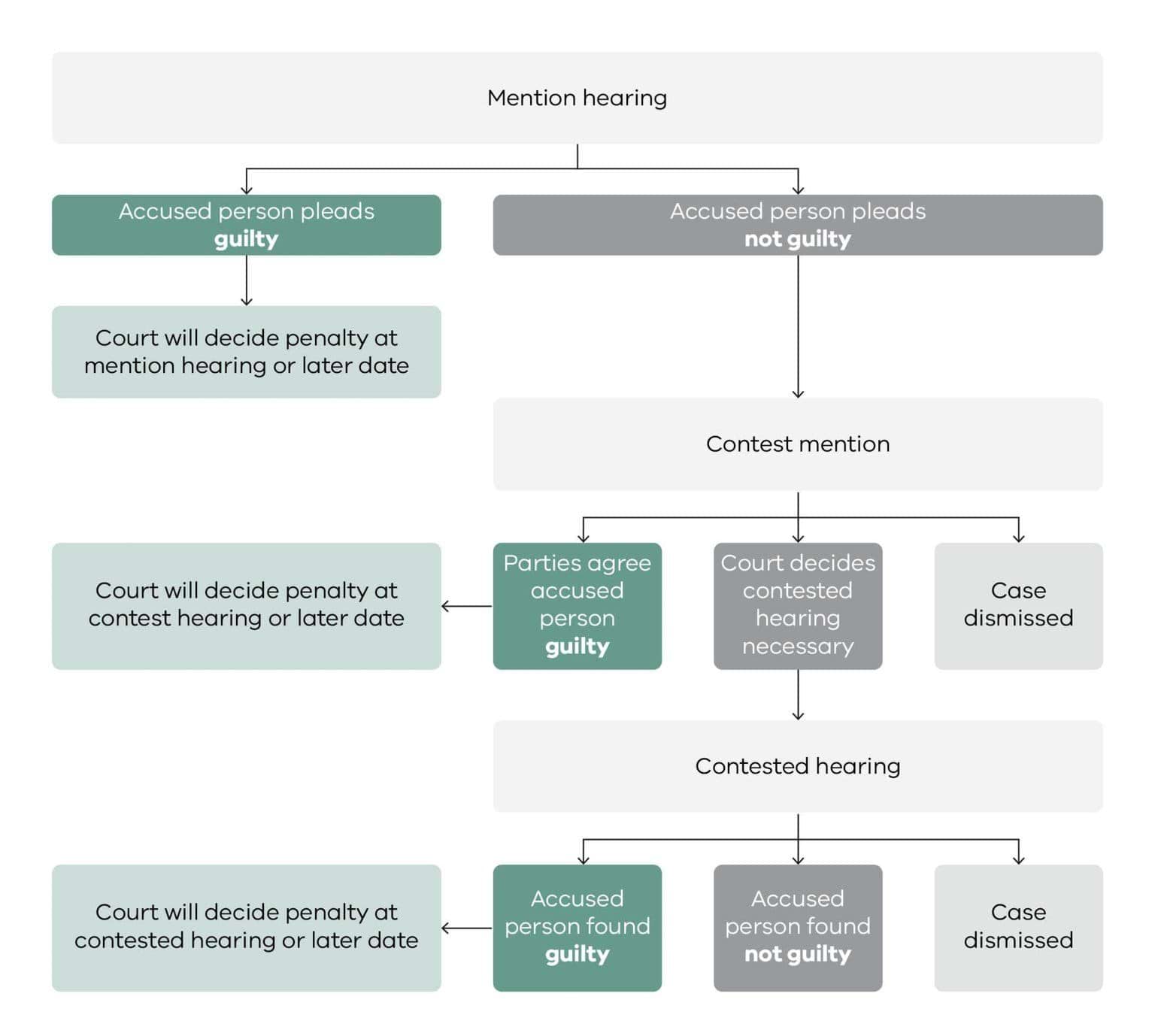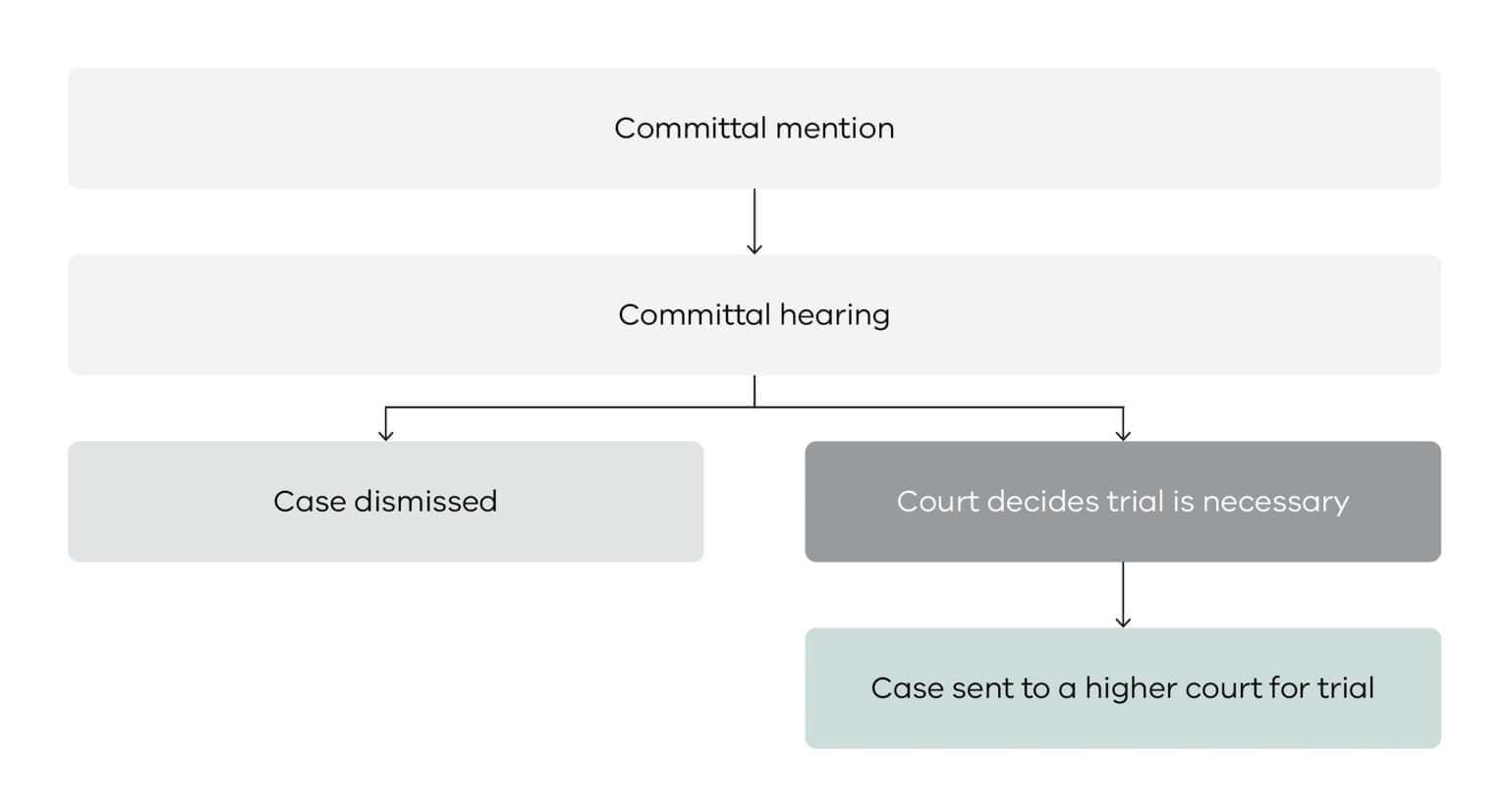If you are needed as a witness for a case in the Magistrates' Court, you will get a summons letter.
If the accused person is found guilty, you can make a Victim Impact Statement to tell the magistrate how the crime has affected you.
In Victoria there are three levels of court.
The Magistrates’ Court handles:
- the entire court process for less serious crimes (called summary offences)
- the pre-trial stage of the court process for most serious crimes (called indictable offences).
You can learn more about the Magistrates’ Court by visiting their website.
Summary offences
Summary offences are generally considered to be less serious. Examples include:
- road traffic offences – for example, careless driving, drink driving and unlicensed driving
- minor assaults
- property damage
- offensive behaviour.
Court process for summary offences
The first stage: The mention hearing
All summary cases begin as a mention hearing.
In this hearing:
- the charge (the crime or offence) is read out to the accused person
- the accused person can plead guilty (which means they agree they have done the crime) or not guilty.
If the accused person pleads guilty, the magistrate will need to decide the penalty (also called the sentence).
The magistrate may:
- make a decision on the day
- postpone their decision and sentence the accused person on a later day. This can be called an adjournment.
Second stage: The contest mention and the contested hearing
If the accused person pleads not guilty at the mention hearing, the case will move to the contest mention. This may happen on the day, but usually will be adjourned (postponed) to a later day.
Contest mention
During the contest mention, the parties (the prosecuting team, the defence team and the magistrate) may:
- come to an agreement on whether the accused person is guilty or not guilty. If this happens the case will not need to go to a contested hearing
- decide that the case needs to go to a contested hearing
- make decisions about what needs to happen at the contested hearing, including which witnesses will need to give evidence.
Contested hearing
At a contested hearing, the prosecution and defence legal teams present their case to the court and a magistrate will find the accused person guilty or not guilty. It is like a trial, but there is no jury.
If you are needed as a witness in the case, you will:
- get a summons letter telling you where and when the case will be
- give evidence at the contested hearing.
You can find out more about:
Sentencing and Victim Impact Statements
If the accused person pleads guilty or is found guilty at any time in the case:
- they may now be called the offender
- the magistrate will decide what penalty (sentence) they should receive.
You can learn more about penalties and sentences.
Any person who has been affected by the crime can submit a Victim Impact Statement.
This is your chance to tell the court how the crime has affected you. The magistrate will consider what you have said as one of many things they consider when they are deciding the sentence.
Indictable offences
Indictable offences are more serious and include:
- aggravated burglary
- indecent assault
- drug trafficking offences
- sexual assault
- manslaughter
- murder.
The Magistrates' Court handles the first part of the court process for indictable offences. The magistrate must decide whether there is enough evidence for the case to go to the County or Supreme Court for a trial with a judge and jury.
The pretrial court process for indictable offences
First stage: The Committal mention
A committal mention is used to decide:
- the date of the committal hearing
- which witnesses are required to attend the committal hearing.
Normally, victims of crime don't have to give evidence at a committal mention.
Second stage: The Committal hearing
The purpose of a committal hearing is to find out if there is enough evidence to put the accused person on trial with a judge and jury.
Victims and witnesses may have to give evidence at this hearing. If you are needed as a witness, you will get a summons letter telling you where and when the case will be.
At the end of the hearing, the magistrate may decide that:
- there is enough evidence for a trial and the case will move on to the County Court or Supreme Court.
- there is not enough evidence for a trial (the case will be dismissed, and the accused person will go free).
Usually it is several months or more between when the committal hearing happens in the Magistrates’ Court and the trial starts in the County or Supreme Court. If the offence is a sexual one, the date of the trial is provided at the end of the committal hearing.
You can learn more about the court process in the County and Supreme Courts.
Updated


